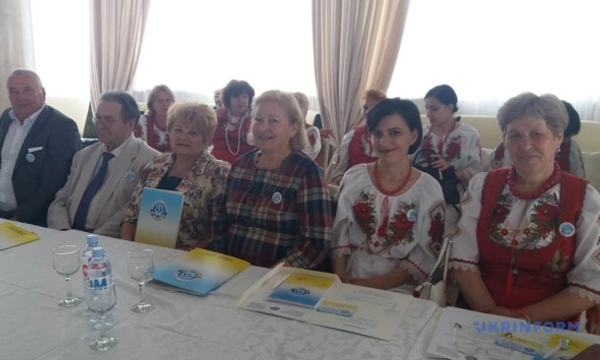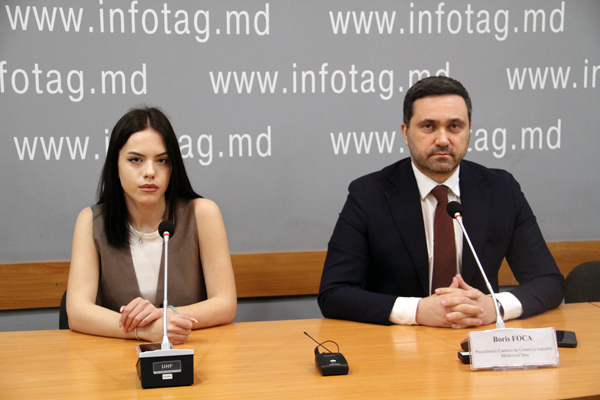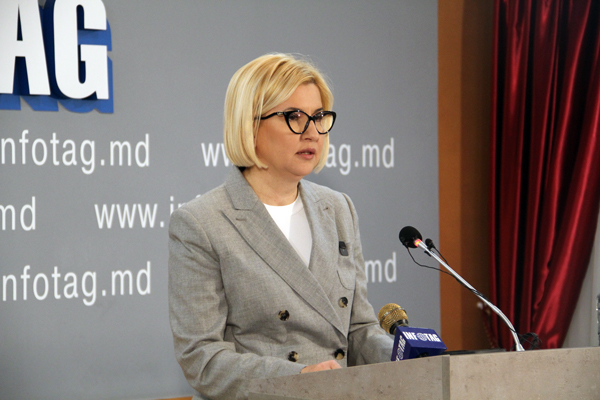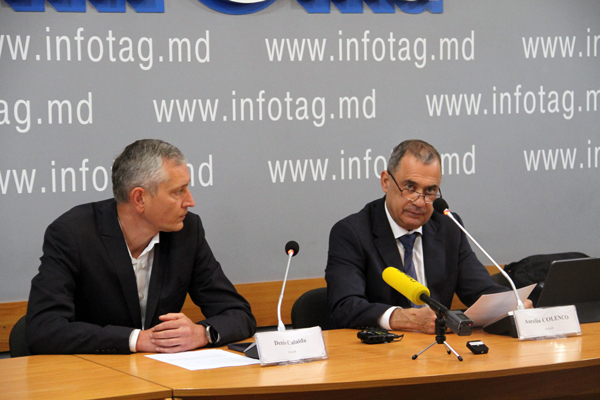Interview
EXODUS OF REFUGEES FROM UKRAINE TO MOLDOVA: EXPERIENCE AND LESSONS

In an interview with the "INFOTAG" news agency, the chairman of the Ukrainian community of Moldova Vitaly MRUG told about the situation of the refugees who found shelter in Moldova after the beginning of Russia's aggression against Ukraine. The president of the Ukrainian cultural movement in Moldova "Letopis" Zinaida GURSKAIA also participated in the conversation.
"INFOTAG": - Russia's military aggression against Ukraine began almost a year ago. Moldova was one of the countries that received the first wave of refugees. How did the Ukrainian community help these people, what difficulties did you face?
Vitaly MRUG: On February 24, 2022, we all woke up in shock at what happened. And for us, grandchildren of grandfathers who had fought, and from textbooks and books, we knew what war was. When we learned about what had happened, I personally, like many other people, was struck with incomprehension and psychological shock.
When I learned about the outbreak of hostilities, I said to myself, "Guys, we have gone too far! It was no longer just the bombing of the Luhansk and Donetsk regions, but went to Ukraine on a large scale. At the same time, there was still hope that this idea of aggression on the principle of "scare and negotiate" - then negotiations would begin and all this would somehow "go away" Unfortunately, everything happened differently.
A whole year is behind us and every day we hear on the news that the conflict is only escalating, the war continues. It's a tragedy, and it's sad. If we remember, on February 24-25, 2022, when we found out that all the customs at the entrance to Moldova were full of refugees, that people were lining up in lines of thousands, that people were coming in winter with suitcases and purses and did not know where to go next... We started calling each other, we started answering questions about how and how we could help our brothers from the historical homeland.
Naturally, almost immediately all of our options were turned on. First of all, we are a public organization represented by individuals. But we all work somewhere and there are heads of enterprises with certain capacities, so on the second day we joined the problem of creation of minimal (for starters) conditions on reception of refugees.
At first, there was no coordinating center and no official information from the government. We had to deal with these issues by contacting community members in the border areas - Stefan-Voda, Ocnita, Briceni, where refugees were first to arrive. The first strikes were against Vinnitsa and Odessa.
Zinaida GURSKAIA: - The very fact of the treacherous attack at 4 a.m. speaks volumes. We have very definite associations with this time and Kiev. Everyone remembers the famous song "...exactly at 4 o'clock Kiev was bombed, we were told that the war had begun". There was a feeling of déjà vu.
For me Ukraine is very close and close, because I was born and grew up there. I know this country, I was there for a long time - in different parts of it, as a journalist. That's why I immediately joined this work. But people were not just brought in, they had to be assigned somewhere, it was good if someone had relatives or acquaintances in Moldova. For some reason, there was a feeling at the time that a week or two or three would pass and this tragedy would cease. What is it - rockets shooting at peaceful villages and cities... It did not fit in the mind of a normal person.
Children, women and the elderly were welcomed, because the men were left behind. All the work was based on personal contacts - acquaintances, relatives, their friends. And no one refused. The whole of Moldova rose up to help.
"INFOTAG": - What is the role of international and non-governmental organizations in managing the refugee crisis in Moldova? How do you assess the activity of Moldovan volunteer organizations in providing first aid to refugees from Ukraine?
Vitaly MRUG: Of course, now there are several organizations and structures that have taken up only refugee problems. I know, for example, the Society of Azerbaijanis of Moldova was engaged in receiving their compatriots from Ukraine. Then the Roma from the neighboring country began to be accepted. The Jewish community is very active. The nation itself is very friendly - they have proved this more than once. They set up a special organization for refugees called Isra AID - a feeding center and set up about a dozen tents during a particularly critical period of the refugee exodus. I emphasize that the State of Israel began to allocate funds to solve the problem of refugees from Ukraine directly from the state budget. All Ukrainian organizations act independently, that is, within the limits of what we can solve. Therefore, without the listed efforts of all structures it would be much more difficult.
"INFOTAG": - How have refugees from Ukraine settled in Moldova? Is it true that there is a certain number of Ukrainian citizens who have decided to tie their fate to Moldova by buying a house here, getting a job, starting entrepreneurial activities?
Vitaly MRUG: - And this is one of the phenomena - finding a job. Thirty-five thousand Ukrainians have tried to find it. Based on statistics from the National Employment Center of Moldova, as of January 19, 2023, 959 citizens of Ukraine found jobs, of which 696 were women and 253 men. Most of the Ukrainians were employed in Chisinau - 720. Over 220 employers expressed their willingness to employ Ukrainian citizens, stating that there were some 2,080 vacancies for these people. More than 570 citizens of Ukraine were registered at employment centers. The figures are small, if we consider that there are more than a hundred thousand citizens of Ukraine as refugees in Moldova.
Not everyone is satisfied with the conditions of work. Those who are not afraid of work can find it. It is possible to eat on the allowance for refugees from the state, but it is still necessary to work in order to dress and live decently. That is why people find a job, and Moldovan authorities help them as much as they can, and some of them bond with the country that accepted them.The Moldovan people have shown their hospitality, generosity, sensitivity and compassion.
"INFOTAG": - Can we talk about such a phenomenon as the return of refugees to their homeland?
Zinaida GURSKAIA: - In 1985, I personally found myself in a similar situation when I left Pripyat during the Chernobyl accident. I worked in the disaster zone for half a year and went all the way there, when we came to Moldova and started with a basin and a rag. We found ourselves with nothing. No housing, no job. Therefore, the problems of refugees from Ukraine were very close to me and I understood what was going on.
As for the exodus. Indeed, when camps and bases that received Ukrainian refugees began to close at the end of summer, and they called from all over Moldova, what should we do? A great many families returned to Odessa and the regions of Mykolaiv and Kharkiv. These are usually regions where there were no hostilities. The women who left returned with their children because their husbands stayed in Ukraine. Either as soldiers or in territorial defense units.Some of the refugees went to Europe, particularly to Romania. Many found jobs and housing in Europe. But there are no serious figures on the outflow. And given that the bombing and shelling of cities has now resumed, we're inclined to think that there will be a second wave of refugees. And the closer we get to spring, the more likely it is.
"INFOTAG": - Do you think a new wave of refugees from Ukraine like the one at the beginning of the war is likely?
Vitaly MRUG: - I hope there won't be a second wave. But even if it happens, we are all in a different situation today. There is the state, the Emergency Situations Commission has been established, there is an established set of relief measures, and there are centers and placement experience. There are 80,000 to 85,000 refugees in the country right now all the time. Sometimes the figure was as high as 115,000. Moldova can cope with this, let us extend a helping hand and not leave our brothers Ukrainians in need!
Thank you for the interview.
























Add Comment